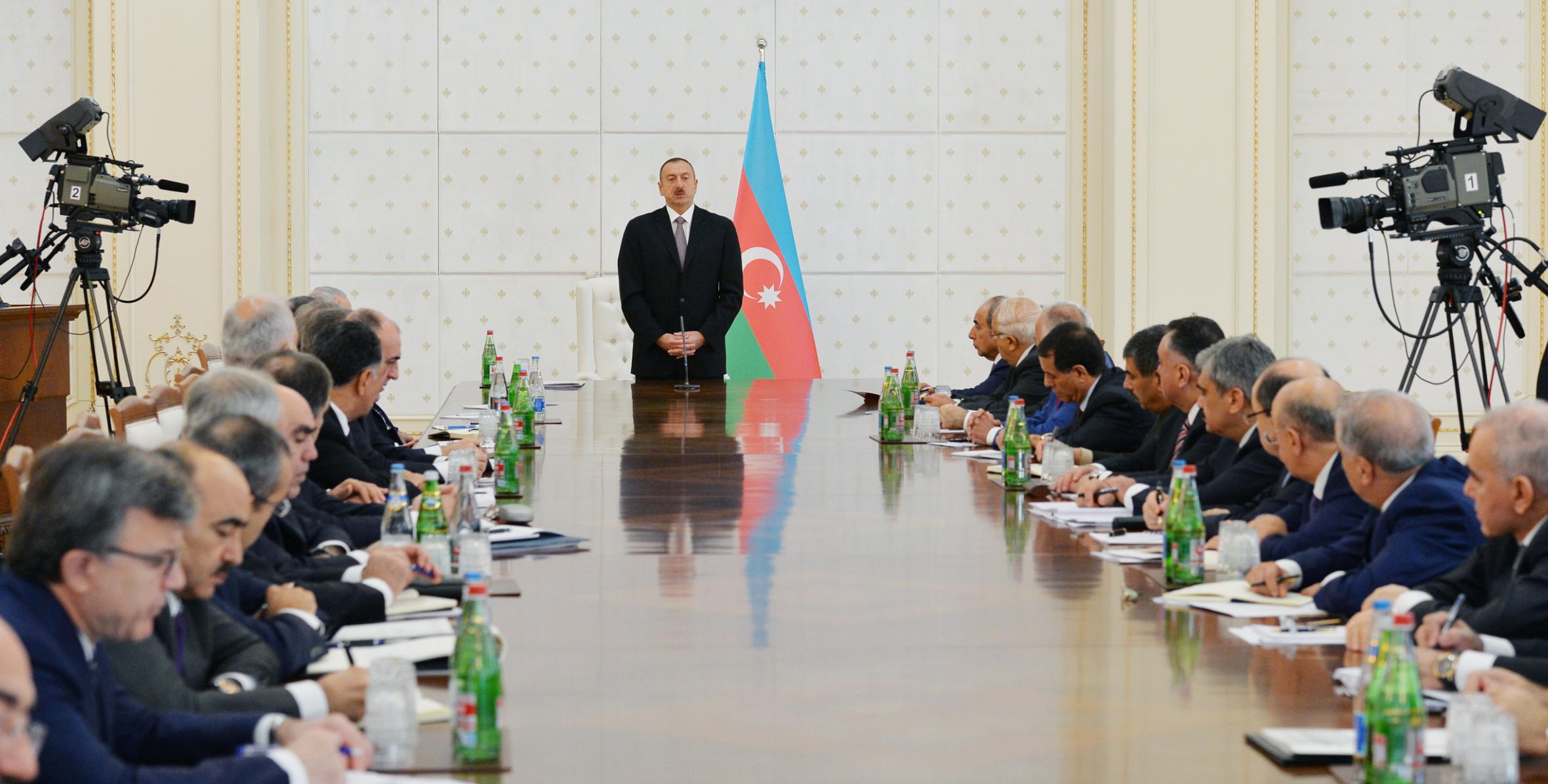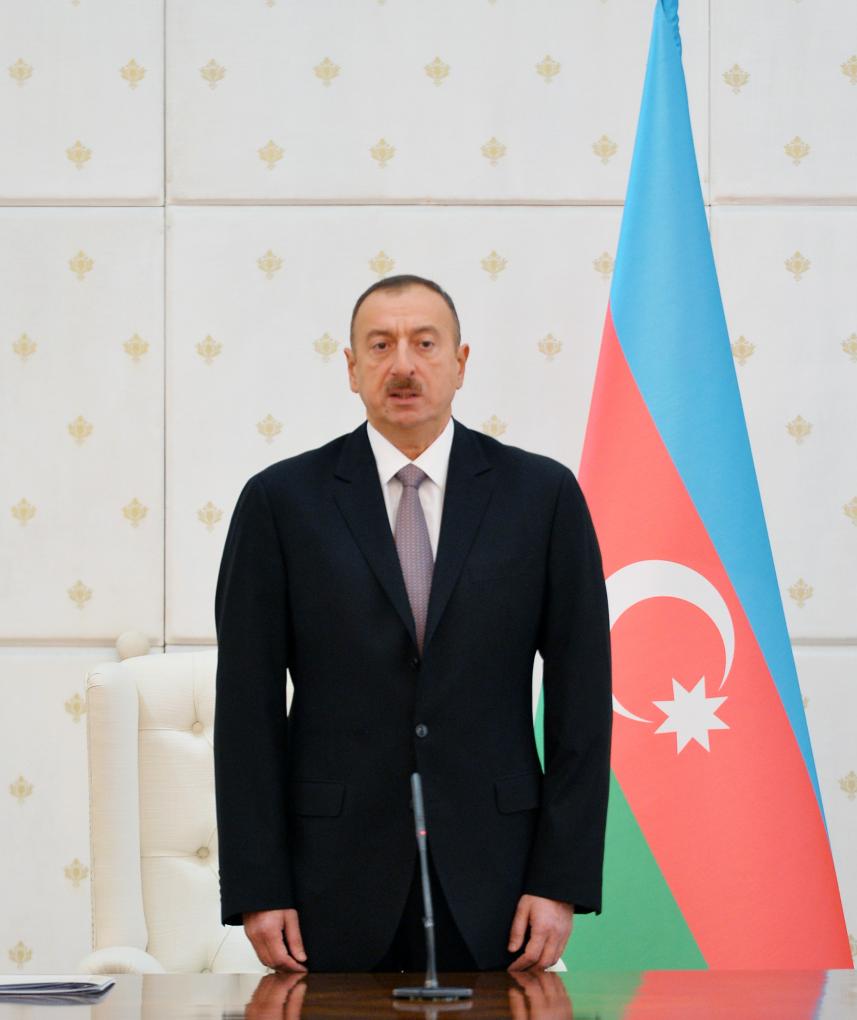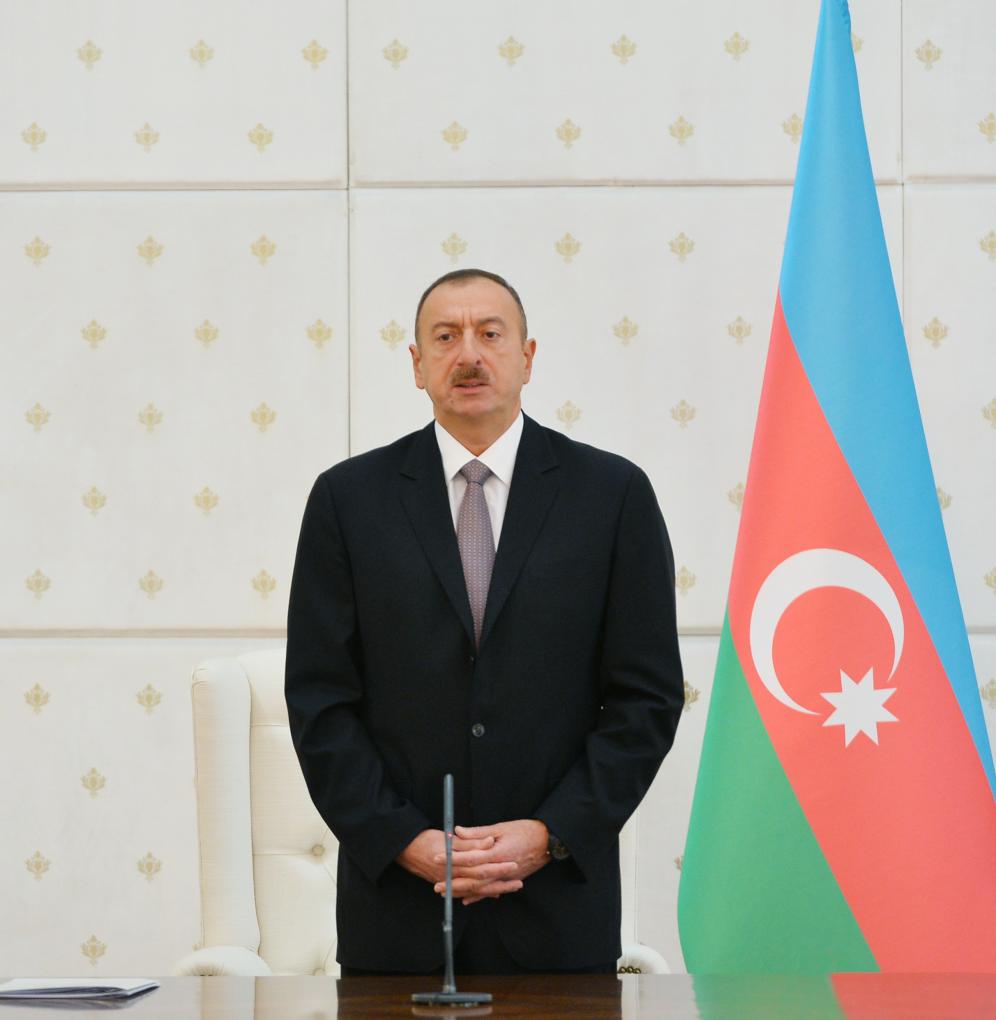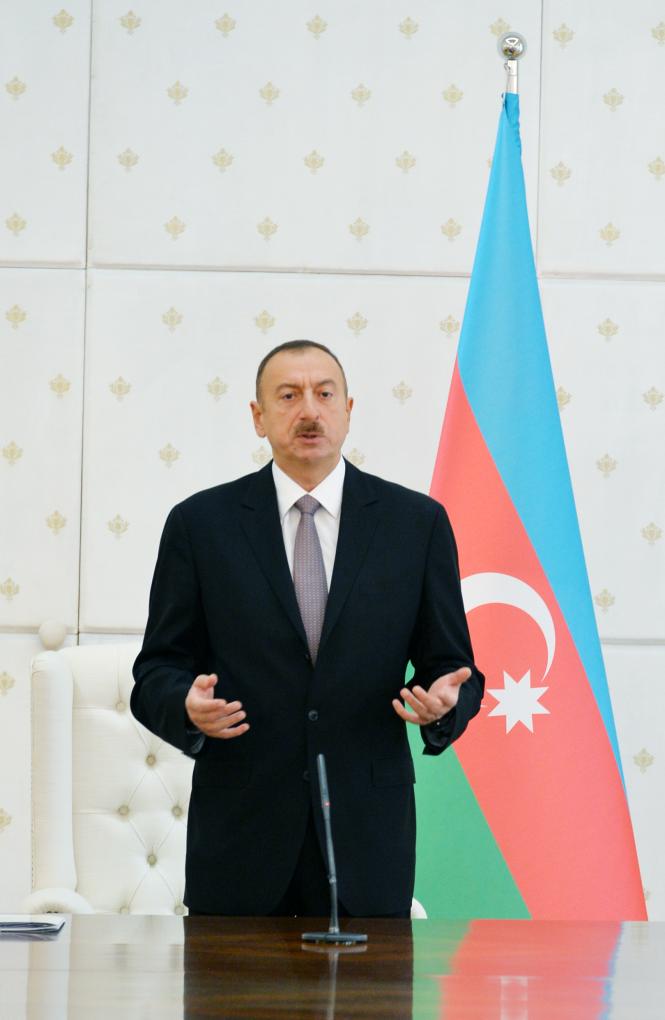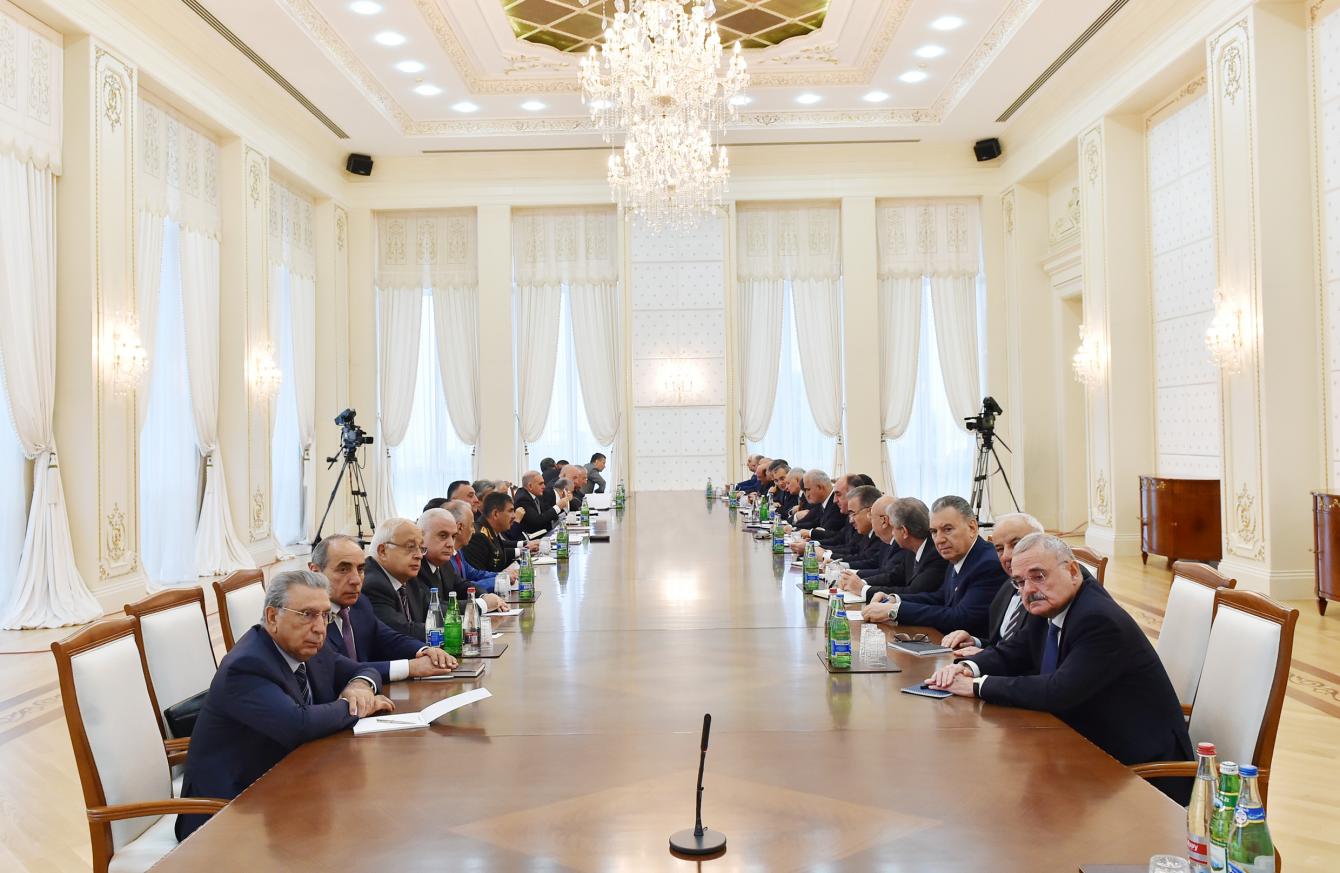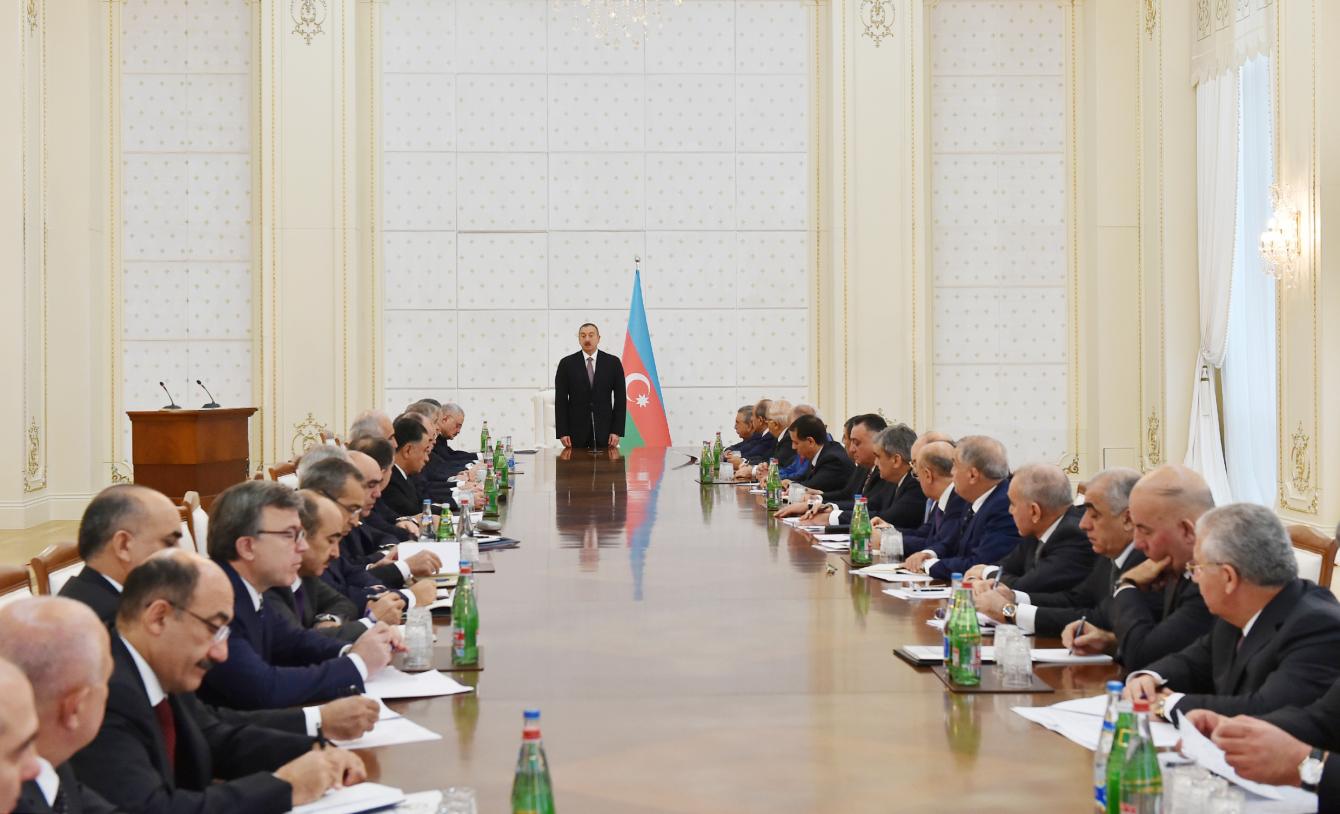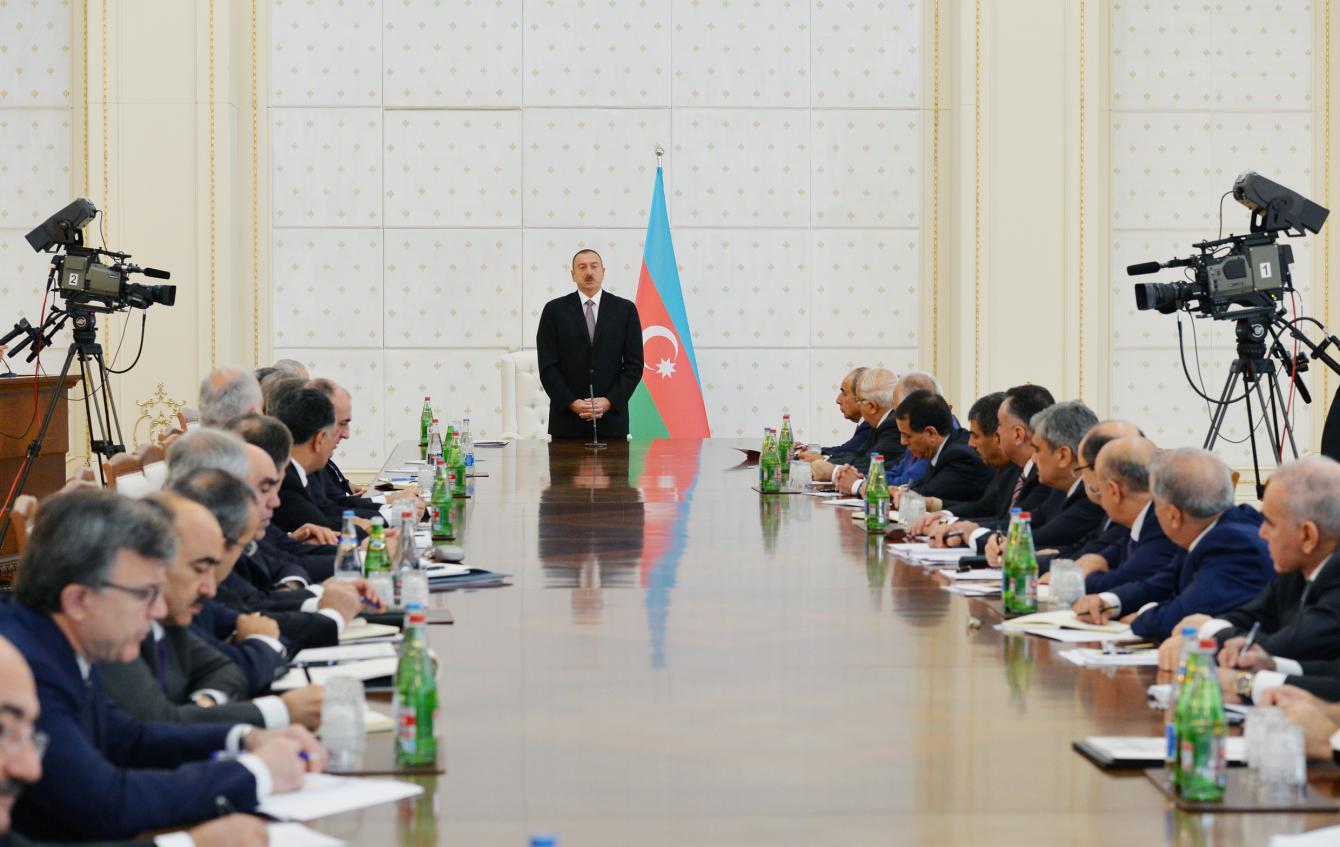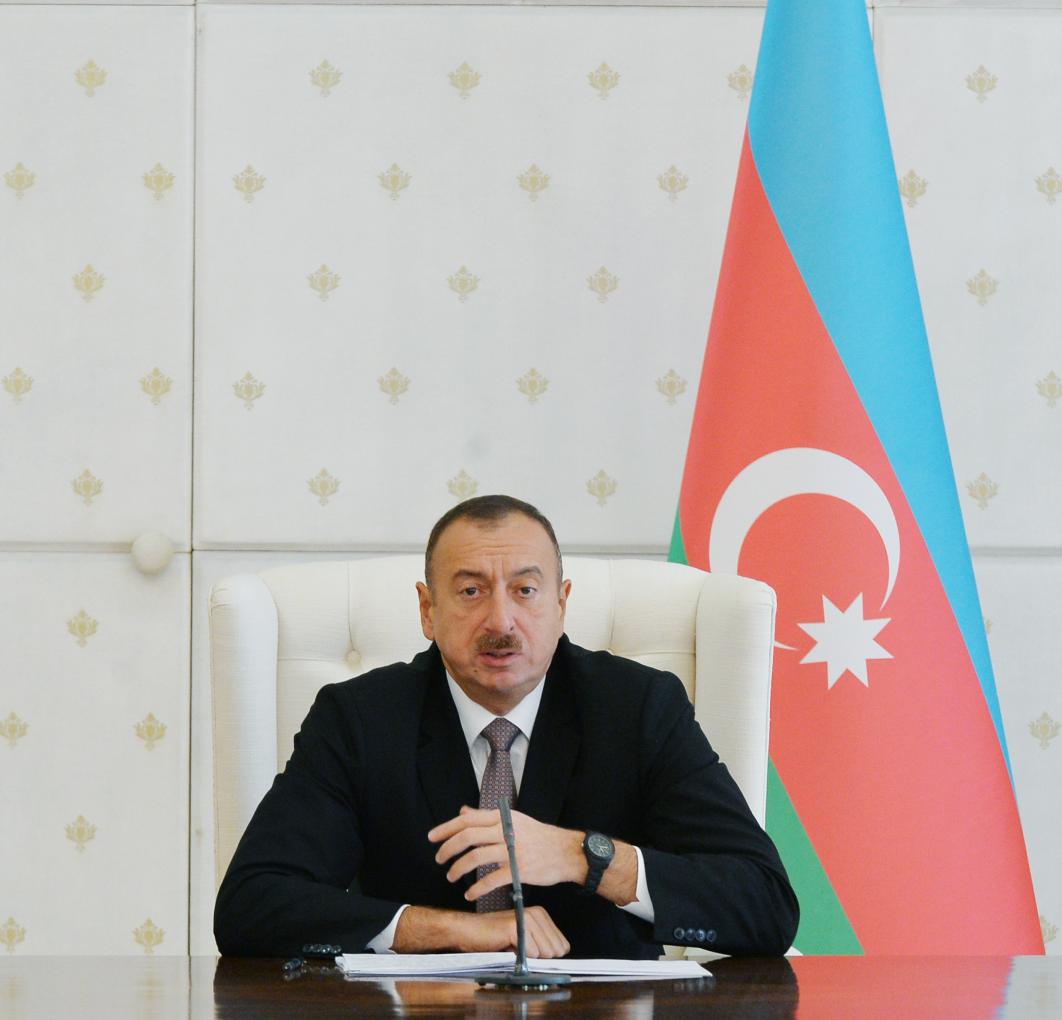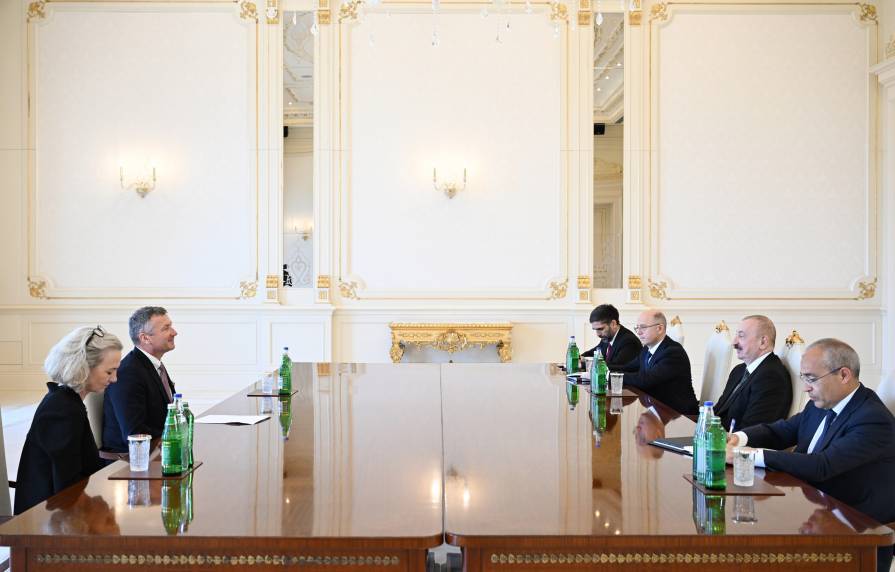President Ilham Aliyev has chaired the meeting of the Cabinet of Ministers dedicated to the results of socioeconomic development in nine months of 2015 and objectives for the future.
The head of state made an opening speech at the event.
Opening speech of President of the Republic of Azerbaijan Ilham Aliyev
- Today's Cabinet meeting will discuss the socioeconomic results of nine months. I can say that the Azerbaijani economy has been developing successfully this year. This in itself is a good indicator, because the developments unfolding in the world and the region are obvious. Both the region and Europe are in crisis – economic, military and political. Under such circumstances, economic development, of course, is a huge success. There is one reason for that. It lies in the fact that Azerbaijan pursues a thought-out and independent policy. We are going down our own path. It is a path of development and progress, and we have made great strides on this journey.
Azerbaijan has achieved stability. The Azerbaijani people live in security and prosperity. Civil unity and accord are strengthening in Azerbaijan. All our people are rallied around one goal – to strengthen Azerbaijan, to further enhance stability and to continue socioeconomic development.
Of course, an independent policy also creates us certain problems, because today's world is dominated by polarization. This process is under way. Large countries want to expand their sphere of influence, and the fact that there is an independent and principled country that has its own position and is not afraid of anyone certainly annoys them. But this should not worry us. I do not pay attention to that, because the main thing for me is the security, development and stability of our country. Therefore, Azerbaijan will continue to follow the path of independence.
The world today is already talking about an Azerbaijani model of development. Our experience in the political sphere, in the regulation of international relations, in domestic development and in the issue of multiculturalism is also studied. In addition, I believe that our model of economic development can also be attractive for many countries today, because we are going along the path of diversification. The country's economy is already diversified. The non-oil sector accounts for about 70 per cent of the gross domestic product.
We have managed to rise to this level as a result of reforms carried out in recent years. Independence, an independent policy and national interests – this is the main task, the main issue for us. We will continue to defend the choice of Azerbaijan despite all the pressure and, in some cases, provocations. We will not deviate from this path. Our socioeconomic indicators once again confirm that we are on the right track.
In nine months, the Azerbaijani economy grew by 3.7 per cent. If we consider that we have achieved this at the expense of the non-oil sector, it is a very high indicator. In general, the regional processes, the bloody clashes and the economic recession, of course, inevitably have a negative impact on our economic development. In addition, the sharp fall in oil prices since the beginning of the year from $100 to 50 and lower has certainly had an adverse impact on our revenues. Despite this, as a result of the reforms carried out, Azerbaijan's economy is still developing. I believe that in the current conditions 3.7 per cent is an excellent indicator. The most gratifying thing is that our non-oil economy grew by more than 6 per cent, which, as I have said, is the result of reforms.
Industrial production has increased by 2.1 per cent and non-oil industry by more than 10 per cent. This, too, is a very positive indicator attesting to the successful implementation of the industrialization policy in Azerbaijan. The task we set a few years ago is being fulfilled. The future economic development of Azerbaijan will be linked to industrial and agricultural production. Therefore, the growth of the non-oil industry by more than 10 per cent both pleases and inspires us, of course. We have to go down this path. Additional measures will be taken to stimulate the development of industry. We will discuss this later.
This year has been declared a Year of Agriculture. I am glad that in the Year of Agriculture our agriculture has achieved a growth of 6.7 per cent. This has been facilitated by reforms ongoing in the country, as well as the support provided to farmers by the state, subsidies, technical support and, in general, our public policy. The establishment of large farms has also contributed to major changes, particularly in the area of crop production.
Inflation in Azerbaijan in nine months has been very low – 3.7 per cent. Population incomes have increased by 5.8 per cent. Thus, population incomes, as it happens every year, are ahead of inflation. This means that real incomes grow every year. This happens despite the fact, as I said earlier, that this year remains difficult for the country and for the region.
The country's economy has received investments in the amount of $16 billion from various sources. Of these, $9 billion is domestic and $7 billion foreign investment. This is also an excellent indicator, because the world today is experiencing a shortage of finance and liquidity. Many countries, including Azerbaijan, are trying to attract more investment. We are also investing major funds in our country. At the same time, Azerbaijan is considered an attractive country for foreign investors. We should try to improve the investment climate, and additional measures will be taken in this regard.
This year, a number of successful projects have been implemented in the social sphere. I should note that the process of creating a social infrastructure is under way. Although our expenses are naturally reducing, we have allocated a fairly large amount this year to create social infrastructure. These funds have helped us to build or repair 34 schools, 26 kindergartens and 11 medical institutions in the country in the first nine months. This shows our intentions and our policy. I have repeatedly said that the focus of our policy is on the citizens of Azerbaijan. Therefore, the social sphere will be in the spotlight as a priority area next year.
I believe that very positive changes have taken place in the field of social assistance. Transparency is being provided. Due to these measures and reforms, this sector is worrying people less. We all know that there were numerous complaints related to this area in previous years. The new system, transparency and social justice have eliminated most of the complaints.
I should also note that thanks to the transparency, the number of people receiving targeted social assistance has dropped by 16 per cent, because the persons not eligible for targeted social assistance on any criteria are not getting it. Those really in need are receiving it, and they are paid more. Today, targeted social assistance is provided to about 500,000 people, or 114,000 families. Each family receives assistance in the amount of 153 manats a month on the average. This is an excellent indicator. I am confident that as a result of poverty reduction in the coming years, the number of people in need of social assistance will reduce further. Our goal, as we declared many years ago, is to completely eliminate poverty as a phenomenon in Azerbaijan. We need to eliminate this social evil. Poverty is at a low level in Azerbaijan – at the level of 5 per cent. It should not exist, and I am sure that we will get very close to this in the coming years.
Quite a lot has been done in the infrastructure sector and in the implementation of infrastructure projects this year. Naturally, as a result of reduced oil prices, our revenues have declined, and so have our expenses. We use only our own resources. We are not inclined to external borrowing. After the depreciation of the manat, our external debt increased because foreign debt is calculated in US dollars. Whereas before the depreciation our foreign debt amounted to about 7-8 per cent, now it has increased to 11-12 per cent. Not because we took additional loans, but because the manat has depreciated. Twelve per cent is also a great indicator. In some developed countries this figure is above 100 per cent. We want our foreign debt not to exceed 10 per cent. To achieve this, we need to build our work only on the basis of domestic resources. Therefore, we must envisage expenses in accordance with what we earn. Reasonable work has been done in the implementation of infrastructure projects. Projects of rural roads, drinking water, sewage, projects related to gasification – all this has been implemented this year, and my regular trips to the regions allow me the opportunity to witness this wonderful change and development.
This year we have created 87,000 jobs, of which 67,000 are permanent ones. This is also a great indicator. The process of job creation should be carried out continuously. I have repeatedly spoken about this, and we must build our economic development model in accordance with this, because economic development, stability and well-being of the Azerbaijani people have contributed to positive demographics. More than a hundred thousand people are born every year, which means that we will certainly need to take extra measures to create jobs in the future. Therefore, this area should also have a new development strategy. I am sure this will be the case.
The jobs created in the regions serve comprehensive development of the national economy, of course. But I should also note that although 67,000 permanent jobs have been created in nine months, about 30,000 jobs have also been closed. This is also a reality. We need to know this reality. We must conduct a serious analysis in order to ascertain the reasons for this process. In fact, it is a natural process. As is the case in any other country, jobs are created and closed in Azerbaijan. We have always registered a positive balance, which is still in evidence today. The creation of 67,000 permanent jobs in a year of crisis is a good result. If we subtract the number of closed jobs, it means that about 40,000 jobs have been created. However, we need to analyze the closure of jobs as well in order to find out reasons for these processes. There may be both objective and subjective reasons. We will talk about it today.
Transport sector is of great importance to the country’s economy. As you know, this sector has received perhaps the biggest funds of all infrastructure projects in recent years, because our geographical location necessitates the creation of a modern transport infrastructure within the country. At the same time, it is necessary to expand our transit opportunities, which should bring us even larger political and economic dividends.
Further development of the transport sector should be even more thoughtful. Today, there is a tough competition for transit cargoes. New transit routes are opening up. Countries of the region are in competition with each other. This is natural as long as it is a sound competition. Azerbaijan should not be a passive observer here. Sometimes we wait for someone to knock on our doors and ask us for permission to transport goods through our territory. We have to be proactive, determine the cargo and offer good conditions. After all, it is a very serious matter. At the end of the meeting, I will address the issue more widely.
I want to note that this year has seen very significant events for the expansion of our transit opportunities. In August, the first container train arrived in Azerbaijan from China through Kazakhstan. A section of the Baku-Tbilisi-Kars railway for which Azerbaijan is responsible is ready for use now. As far as I know, work in Turkey is drawing to completion. According to the information provided, this line should be ready in Turkey next year. Therefore, all relevant agencies, of course, should work in a coordinated manner. This line will bring us huge dividends. At the same time, there are good results related to the North-South transport corridor, which will further enhance the geo-political and geo-economic importance of Azerbaijan.
In nine months, we have done a great job and taken steps to establish the Southern Gas Corridor. As you know, the Southern Gas Corridor was initiated by our country, and significant steps aimed both at the development of the Shah Deniz-2 field and the implementation of the TANAP project have already been taken. We have tried and will keep on trying to make sure that the project is implemented in a timely manner. We should try to make sure that an important part of the TANAP project – Azerbaijan is the key shareholder and the responsibility rests on us – is put into operation in a timely manner, in 2018.
Azerbaijan, of course, is a shareholder in other projects – Shah Deniz-2 and TAP, but we are not the main shareholders. Therefore, the main responsibility for operatorship rests on other organizations. As far as TANAP is concerned, Azerbaijan is the main owner. This project being our responsibility, I am sure it will be implemented in a timely manner.
Army building is an area that is always in the spotlight. We always pay great attention to this sphere. This is natural, because Azerbaijan is in a state of war, the war is not over and the Armenian-Azerbaijani Nagorno-Karabakh conflict is not a frozen conflict. This is clear to everyone, including the mediators dealing with this issue.
Army building will be a priority area next year too. This sphere will receive as much money as necessary. The process of purchasing and manufacturing of new machinery, weapons and ammunition is currently under way. At the same time, military units and bases are built at the highest level. This year, we put into operation a large naval base. A new infrastructure is emerging in the regions close to the line of contact. Our fighting capacity is increasing. The situation at the contact line is no secret to the Azerbaijani public. We have full advantage, are dealing crushing blows to the enemy and giving adequate responses to all of the enemy’s provocations.
Yet another enemy provocation was foiled last month. A major provocation was prepared against us and many saboteurs were mobilized for an attack on Azerbaijani positions. Our army stopped that provocation. As a result of a pre-emptive strike, the enemy suffered heavy damage and many of the invaders were eliminated. Of course, the Armenian side, as always, immediately raised a hue and cry. But there arises a natural question: on what territory were the occupiers killed? In Armenia? No, they were on our lands, on occupied lands. The question is what they were doing there? In fact, the vast majority of the people killed there were citizens of Armenia, not even the residents of Nagorno-Karabakh. In other words, the Armenian army conducts an aggressive policy on our lands. This is as clear as day. Unfortunately, the international community and mediators do not want to see that. They fail to send serious messages to the invader. This is why they have got out of hand and resort to various provocations against us. But their provocations fail time and time again. Just like in November of last year when a helicopter that attacked our positions was destroyed. In September this year, they also suffered heavy losses. And we will punish them every time.
We must and we will restore our territorial integrity. The Nagorno-Karabakh conflict must be resolved on the principles of international law. The territorial integrity of our country is no less important than the territorial integrity of any other country. The issue must be resolved within the framework of international law and the territorial integrity of Azerbaijan. We are strengthening our economy and building up our army. We will take the necessary action at any time.
The Armenian dictator is even making statements that completely contradict the official position of Armenia. He declares that Nagorno-Karabakh is an integral part of Armenia. First, Nagorno-Karabakh is historical and native Azerbaijani land and an integral part of Azerbaijan from the standpoint of international law. This is recognized by the entire world community and the United Nations, and no country considers Nagorno-Karabakh as part of Armenia, does not accept and never will accept it as an independent entity. Therefore, this strange and irrelevant statement, to say the least, was apparently made in a very tense psychological state. It exposes Armenia as an occupier and disgraces its leaders. Everyone should be responsible for what he says today, especially someone holding a high public office. But one can hardly expect anything more from the junta, because the current Armenian government consists of war criminals who committed the Khojaly genocide, those who were heavily involved in the policy of ethnic cleansing carried out against the civilian population during the occupation of Azerbaijani lands. It is impossible to expect anything more from them. However, it is also true that the ruling Armenian regime and dictatorship has become a threat to the Armenian people proper. The Armenian people can no longer stand it either. They are fed up with this criminal and corrupt regime. There is a huge resettlement from Armenia. So much so that they are seeking salvation in Azerbaijan. They are coming to Azerbaijan. Look at how the regime has got out of hand, at what dirty deeds it is committing against its own people. Even today, people migrate from Armenia to Azerbaijan and live peacefully here. There can be no confrontation, no misunderstandings on ethnic or sectarian grounds in Azerbaijan.
Azerbaijan is a strong country that has achieved great progress in economic and political spheres. Azerbaijan is playing a very positive role in regional security. Azerbaijan is a stabilizing factor. No project can be implemented in the region without our participation and consent. Our economic and military potential multiplies our strength, and today we are in control of the situation on the contact line. We will gradually become even stronger, while Armenia is weakening. There is no room for development in Armenia. There are no objective factors for the development of Armenia under this dictatorial regime.
We will go our own way. We will meet all our goals by the end of the year. I am confident that we will successfully complete next year too.
X X X
Other speakers at the meeting included Minister of Economy and Industry Shahin Mustafayev, Minister of Healthcare Ogtay Shiraliyev and Minister of Education Mikayil Jabbarov.
XXX
Closing speech of President of the Republic of Azerbaijan Ilham Aliyev
- There are two and a half months left for the end of the year. I am confident that all of the work on our agenda will be done by the end of the year and we will end 2015 with good results.
Preservation of macroeconomic stability will remain a priority next year too, because it is a very important area. Macroeconomic stability of any country is the main condition.
Reforms should be deepened. A lot has been done as a result of economic reforms. This is noted by international bodies. The Davos World Economic Forum has again honored Azerbaijan with a high place. Azerbaijan is in 40th place for economic competitiveness. In the CIS, we are still in first place and this, in fact, is a vivid example of the work done. We should try to further deepen the economic reform and take additional measures to liberalize the economy.
We are pleased with a high score of the Fitch rating agency. This is a fair approach. As a result of the work done in Azerbaijan, Fitch has awarded the investment rating of BBB to Azerbaijan in the economic sphere despite the fact that the region is still undergoing a financial and economic crisis. BBB is a very good result, but we must try to achieve even higher ratings. I believe that additional measures to be taken will help us achieve that.
It is necessary to strengthen the financial discipline. We can’t allow waste and unnecessary spending. In some cases, government agencies insistently ask the Finance Ministry for extra funding. This must stop. We are doing everything we have resources for. Everyone, including countries, should live within their means. This policy has saved us from all possible economic risks because if we had spent more than we earned, we would be in dire economic straits now. Therefore, we must stop funding non-priority projects and such instructions have been given. At the same time, sufficient funds will be allocated for all major projects.
It is necessary to review the structure of budgetary spending and spend budget funds economically. In short, we need to ensure full transparency in financial and economic spheres.
Tax and customs authorities should also work transparently and effectively. They can collect more money into the budget. Such capacity and resources are available. Tax and customs bodies have been appropriately instructed to identify these resources next year and collect more funds into the budget. Of course, we need to expand the tax base. We all know that the opportunities are quite broad. Entrepreneurs should pay taxes. Everyone, every entrepreneur has to pay state tax. Unfortunately, the culture of paying tax has not been fully established here yet.
At the same time, you should not lay unreasonable claims on entrepreneurs. In other words, they should not be required to pay bribes and other facilitation payments. In this case, our budget will be increased on the account of the non-oil sector, and this is exactly our goal. I have already tasked relevant bodies. All our current costs should be generated by the non-oil sector, tax and customs. As to the traditional transfers from the State Oil Fund, they should be channeled into investment projects only.
We need to revise the current system of tax benefits and exemptions. We have this experience. We applied it to encourage local production, create new enterprises and install foreign equipment here. I think that these issues should be reconsidered. The development of non-oil exports should be encouraged also through tax mechanisms.
We need to fight corruption and bribery more vigorously. This fight is under way, but I can’t say we have fully achieved our goal. Of course, administrative and punitive measures will be taken. In addition, we should take steps of a systemic nature and conduct institutional reforms. We see very often that administrative measures and penalties do not produce the desired effect, are of temporary nature and the replacement of people proves not as effective at times. It is therefore necessary to continue systemic reforms, make new proposals and, of course, widely apply the experience of “ASAN xidmət”.
The creation of “ASAN xidmət” was a kind of revolution in the field of public services. In a short time, 6 million people have applied to “ASAN xidmət”. The vast majority of people are pleased with its services. There is no corruption, bribery or bureaucracy at “ASAN xidmət”. What does this show? First, it shows that we have a strong political will to combat corruption and bribery. Second, it shows that it is possible to eliminate corruption and bribery. If it is possible at “ASAN xidmət”, then why should it be impossible in other areas? Therefore, every state agency should draw the right conclusions here. The experience of “ASAN xidmət” should be applied everywhere, and the scope of “ASAN xidmət” should be expanded. We have provided “ASAN xidmət” with new functions this year – namely those related to the most corrupt spheres. So I expect new proposals from the government: what services and functions should we provide to “ASAN xidmət”? I want to say again that all other bodies should also apply this experience.
Of course, a lot depends on the people too. I have repeatedly asked our citizens through my speeches to be more active. We need to strengthen public control. Without public scrutiny, we can’t beat corruption and bribery. Therefore, public policy and strong political will already manifest themselves. There are changes for the better. Institutional measures are taken, reforms are carried out and this fight enjoys broad popular support. This support should be even more active.
For a successful and sustainable continuation of our development, the priority is to develop private enterprise. The private sector today is developing, including through the provision of soft loans by the government. These loans are allocated to the real economy. In the future, we need to work harder in this area to maximize business development. Entrepreneurs are provided with political support, guidelines and, of course, material resources to build up their businesses. Currently, key infrastructure projects in the regions are practically over, roads, communications, electricity, gas and water lines are laid. Therefore, there are ample opportunities for business development in the regions and Baku.
We should try to attract foreign investment to the non-oil sector. So far, foreign investors have been showing interest largely in the oil and gas sector. This is natural, because there they get more profits. Our policy, of course, is that foreign investment in the oil and gas sector should be made. If we consider that the Southern Gas Corridor project is currently under way, it certainly requires major funds, but our top priority is to attract foreign investment to the non-oil sector. I think that all agencies should work even harder on this. We need to conduct presentations – of course, business forums are held and we try to motivate foreign investors. At the same time, it is necessary to improve the business environment in Azerbaijan. To do this, we need to take extra measures, and I look forward to receiving the government’s proposals on how we can improve the business landscape.
I should note that international financial institutions and influential international organizations appreciate the reforms carried out in Azerbaijan. This, in fact, is evidenced by the current realities of Azerbaijan. We are developing our economy in such a challenging geopolitical situation – in the conditions of political, financial and economic crisis. But I want our development to be even more rapid and all artificial obstacles hindering our development to be eliminated. Quite often, these artificial obstacles stem from corruption and bribery. Therefore, corruption and bribery are not just a social ulcer and a disease. They are a huge impediment for our economy. Therefore, improved business environment should be seen as a priority issue.
Along with this, there is a great need for improving the system of governance. We need to revise this area. Today, Azerbaijan's economy is developing in a new situation. There was a time when our economic growth was 20-30 per cent annually. Of course, this was due to a sharp increase in oil production and rising oil prices. Those times are over. At present, Azerbaijan's oil production has stabilized, and I am sure it will remain stable for many more years. Of course, today we are working on a major gas project. This, too, will bring us additional revenues. Along with this, I think it is necessary to eliminate the factors hindering out development, in particular, those that create problems in the field of governance. This also requires serious reforms. Some agencies overlap. We shouldn’t allow this. It is necessary to pursue a policy of optimization. This sector should also receive sufficient attention.
Non-oil sector, of course, is the main driving force of our economic development. As I mentioned, about 70 per cent of our gross domestic product is already generated in the non-oil sector. This is an excellent indicator. But it is also true that a different picture is observed in exports, of course. This is perhaps natural because our main exports are oil and gas. In addition, in recent years we have tried to provide the domestic market with local products and reduce dependence on imports. We have practically achieved this. This is why we must try to ensure that non-oil sector goods are competitive. We need to pursue a policy of focusing on exports.
I am sure that very serious steps will be taken to improve the business environment and give an impetus to business development. I must say that there are numerous complaints related to inspections. There are many checks, while inspecting authorities seem to be in competition with each other. This is intolerable. Most of the checks pursue selfish goals. An inspector comes, checks something, overlooks something else, but eventually gets his share and leaves. This is a reality. It is no secret. This must end too. Therefore, I expect to receive detailed information about checks in a short time: what bodies check whom, how many times a year and why. There should be a system. We need to develop a mechanism to regulate inspections. There should be certain conditions – who should inspect whom, when and how long. In general, we need to drastically reduce the number of such checks.
Local executive authorities, including law-enforcement agencies, sometimes create problems for businesses and demand money from them. Entrepreneurs are not indebted to anyone – neither representatives of local executive authorities nor law-enforcement officials. They must only pay state tax and that is all. Entrepreneurs are suppressed, skinned and tortured. This is unbearable. Look – about 30,000 jobs have been closed. We have created 67,000 permanent jobs and closed 30,000. This is what we need to analyze. I need information on the reasons for which these jobs have been closed. It is necessary to invite the leaders of these enterprises and question them. This must end. Of course, there are objective reasons, but there are also subjective ones. People come and put forward unreasonable demands as if someone is indebted to them. No-one is indebted to anyone. Those committing such acts will be severely punished. They should give up these dirty deeds. First of all, this runs counter to our policy. On the other hand, it does not allow our economy to develop fully and entrepreneurs to work quietly in the country.
We have too many licenses. I am told that their number keeps on growing. It should actually grow less, but it is growing. Why? Because relevant bodies are trying to increase their number. What is a license? It is a source of money, a method of illicit enrichment. What is this for? We need to seriously examine this issue. The government should list the licenses being issued and whether they are justified or not. The number of licenses should be sharply reduced. We have chosen a liberal economy model, a market economy, and we are moving along this path. Look at the great success we have achieved. If there were no obstacles in the country, we could have achieved even more. Look how much we could have increased our budget if there was no bribery, corruption, checks, licenses and collection of shares. How long can we tolerate this? Enough is enough. Our patience is over. Let everyone draw the right conclusions. If they don’t, they will be punished.
One of the major problems for the economy is monopolism. Unfortunately, we have not achieved tangible results in this area yet – both in terms of production and imports. I do not know what kind of a psychology it is to believe that if I manufacture a product, no-one else should produce it. One should give an opportunity to someone else, so that there is competition. There will be no development and quality without competition. Let everyone produce. It is true that our market is quite limited, but then you should cultivate and manufacture products to sell abroad. And the state will encourage that. The main area that will ensure future development of our economy will be exports. I have repeatedly spoken about this. We are very seriously preparing for this. It has been mentioned here that we have set up logistical centers abroad. What for? We invest abroad to ensure that our products are delivered there, to new markets. We do this for businesses to have the opportunity to easily sell their products there. But here, if someone produces something, they make it impossible for others to do the same. Or people resort to a variety of ways to attract patrons. This can’t be tolerated. We shouldn’t allow monopolism associated with imports. Let me repeat that we are pursuing a policy towards an open market. This is our policy, our public policy, the policy of the President. Therefore, all structures must pursue this policy, that's all!
This year is a Year of Agriculture. As I have already noted, agricultural production has increased by 6.7 per cent. Agricultural development and growth is both social and economic sphere. We have tried and will continue trying to provide ourselves with basic food commodities by 100 per cent. We are approaching this goal. It has been mentioned here that 30 large farms have been set up, 40,000 hectares of new acreage has been put into circulation. Large grain farms harvest 50-60 quintals of crops per hectare. This is a very high figure considering the fact that our average yield was 25-26 quintals until recently. This year, the average yield is above 30 quintals. This is a record figure. Therefore, further measures will be taken to address the issue of food security. We will put new acreage into circulation. By commissioning of two large water reservoirs – Takhtakorpu and Shamkirchay, we plan to irrigate thousands of hectares of land. The Ministry of Economy and Industry is working to prepare a business plan. Private entities should also take interest. The new acreage will be used to grow crops, much of which will be exported.
Azerbaijan is successfully pursuing a policy of industrialization. As I said, non-oil industry in Azerbaijan has increased by 10.2 per cent. Industrial estates are being established. This is also proving effective. The Sumgayit Chemical Industry Park is expected to attract investments of $1 billion. Work has already begun. We need to create special industrial zones in all our districts. A pilot project is already being implemented, and I am sure it will be successful.
There are plans to continue infrastructure projects. Projects of rural roads, gasification and drinking water – these processes are already widespread in all our districts. We expect to launch a new treatment plant at the Jeyranbatan water reservoir. This is a very large project. Several years ago, I attended a groundbreaking ceremony for this project. Today, this project is almost ready. This project will play a key part in providing Baku with clean drinking water. At the same time, we must continue creating a social infrastructure. Schools, hospitals, kindergartens – all of this is always in the spotlight. We need to incorporate these projects in the public investment program for next year.
A serious turnaround has been created in the pharmaceuticals market. The government has already taken this area under its own control. In previous years, it was largely perceived as a business area – i.e. there was a market, demand and supply. The market regulates everything. But when we began to deal with this issue more closely, we saw huge violations there.
The prices of some drugs were inflated several times. We were not very pleased with their quality either. We are now introducing a new mechanism of state regulation. Starting from 15 September, people have had the chance to feet it. Until the end of the year, most of the drugs will be sold at new prices. Great attention is also being paid to the quality of medicines. The prices of medicines are falling and will continue to fall. This, in the first place, is a serious social step. On the other hand, work in this area was built incorrectly. There are many spheres like that. It is therefore necessary to analyze every area. Wherever there are shortcomings and drawbacks, they must be eliminated. As for the market of medicines, we can say that we worked hard for about a year, some analysis was made and there are already great results. The people are happy. The government has taken this area under its own control now. I am sure that the tax obtained from imported drugs and the money in the form of customs duties will be increased now. In other words, our budget will benefit from this.
In my opening remarks, I noted that the transport sector was very important for our future development. The North-South and East-West transport corridors must pass through the territory of Azerbaijan. Today, cargo is transported through Azerbaijan, but in some cases the volume of cargo has reduced. There are objective reasons for that. We should acknowledge that. The world is in crisis and economic activity both in Asia and in Europe has significantly decreased. Asia and Europe trade through our territory. So there are both objective and subjective reasons.
In recent years, we tried to create a transport and logistical center in Azerbaijan, and have been able to achieve this to a large extent. We have purchased new vessels, ferries, tankers, bulk carriers and new cargo aircraft. We have built several international airports in Azerbaijan. Steps are being taken to develop the railway. We have built highways linking us with neighboring countries. Unfortunately, these projects are not yet fully completed, but most of them have been implemented. We are building a new international trade seaport, which will be the largest trading port in the Caspian basin. This work is carried out with public funds. No private funds have been invested. In some cases, loans have been provided, but these are being repaid by the state. This is the policy pursued by the government. Along with this, there should be coordination as well, because the North-South corridor will bring us huge revenues. This route passes through Azerbaijan and will attract millions of additional cargo to our territory. This will bring both political and economic dividends.
Unfortunately, the construction of the Baku-Tbilisi-Kars railway has not been completed yet even through it has been eight years since the project was launched. In 2007, we, the three countries involved, launched this project. As I said, the issues under the responsibility of Azerbaijan have already been resolved. The rest of the work on the territory of Turkey will also be done. We need to put this railway into operation as soon as possible because countries and companies are in competition for cargo. We are sitting here and waiting for something to happen. We are waiting for someone to come and ask us. And when they do, we put forward such conditions that the requester walks away. This is intolerable. This issue must be seriously analyzed, and we must apply a unified tariff policy. The Caspian Shipping Company, the railway and the port – each of them has its own corporate interests. But are they consistent with the interests of the country? No, they are not! The interests of the state are to create a corridor for the sender of goods not to have a headache or have to apply for 10 and 20 people, but resolve the issue by e-mail, in a modern fashion. This is only a part of the issue. We must create this, and relevant instructions have already been issued. There must be serious coordination here. In the near future, I expect to receive specific proposals. Another issue is that we need to attract these cargoes. We should offer to transport them through the territory of Azerbaijan. So these two factors are very important. I am sure that the tasks I have set here will be resolved soon.
We have recently taken serious steps related to municipal transport. A new company has been set up. The buses of “BakuBus” are of the highest level. Perhaps these are the most beautiful and modern buses in the world. We have done this for our people to enjoy public transport. I believe that the scope of “BakuBus” should be expanded, because in comparison with other services, people, of course, prefer “BakuBus”. Therefore, I believe that the state budget for next year should envisage funds for the purchase of more buses. By purchasing additional buses every year, we can further expand the activities of “BakuBus”.
The construction of the underground is under way. I am sure that next year we will celebrate the opening of some new stations. We have launched the Baku-Sumgayit train service. These are modern trains. A new railway track has been laid. All this is done for people’s comfort.
After the first European Games, the interest in Azerbaijan has been increasing. I am sure that this will manifest itself in the tourism sector too. It is also necessary to pursue a policy of attracting tourists. Here too, we have to be more active. The first European Games have somewhat presented our country to the world. We have shown Azerbaijan to Europe and the whole world as a modern, beautiful and developing country. We have shown Baku as one of the most beautiful cities in the world. The interest in us, of course, is on the increase. Next year's Formula 1 competition is, perhaps, the first or second competition in the world is terms of its proportions. It will attract additional attention. These are excellent opportunities for attracting foreign tourists to Azerbaijan. This process is under way, but it can go even faster.
Finally, next year we need to do very serious work to create the Southern Gas Corridor. Construction work is already beginning. This also requires coordination. All agencies should work so that there are no delays at all. The Southern Gas Corridor is a large multinational project being implemented on Azerbaijan's initiative and with the active participation of neighboring countries. This project will provide long-term interests of Azerbaijan, ensure our political, economic and energy interests and turn Azerbaijan into an even more important country for the world. I am very pleased that all members of the Southern Gas Corridor, all countries involved take a common position here. As you know, the first Advisory Council meeting of the Southern Gas Corridor was held in Baku on the initiative of Azerbaijan in February this year. The Declaration adopted by the Council reaffirms the leading role of Azerbaijan. This is a great honor and huge responsibility. All projects implemented on our initiative to date have been successful. I am confident that the Southern Gas Corridor will also be another victory for Azerbaijan. Thank you.

